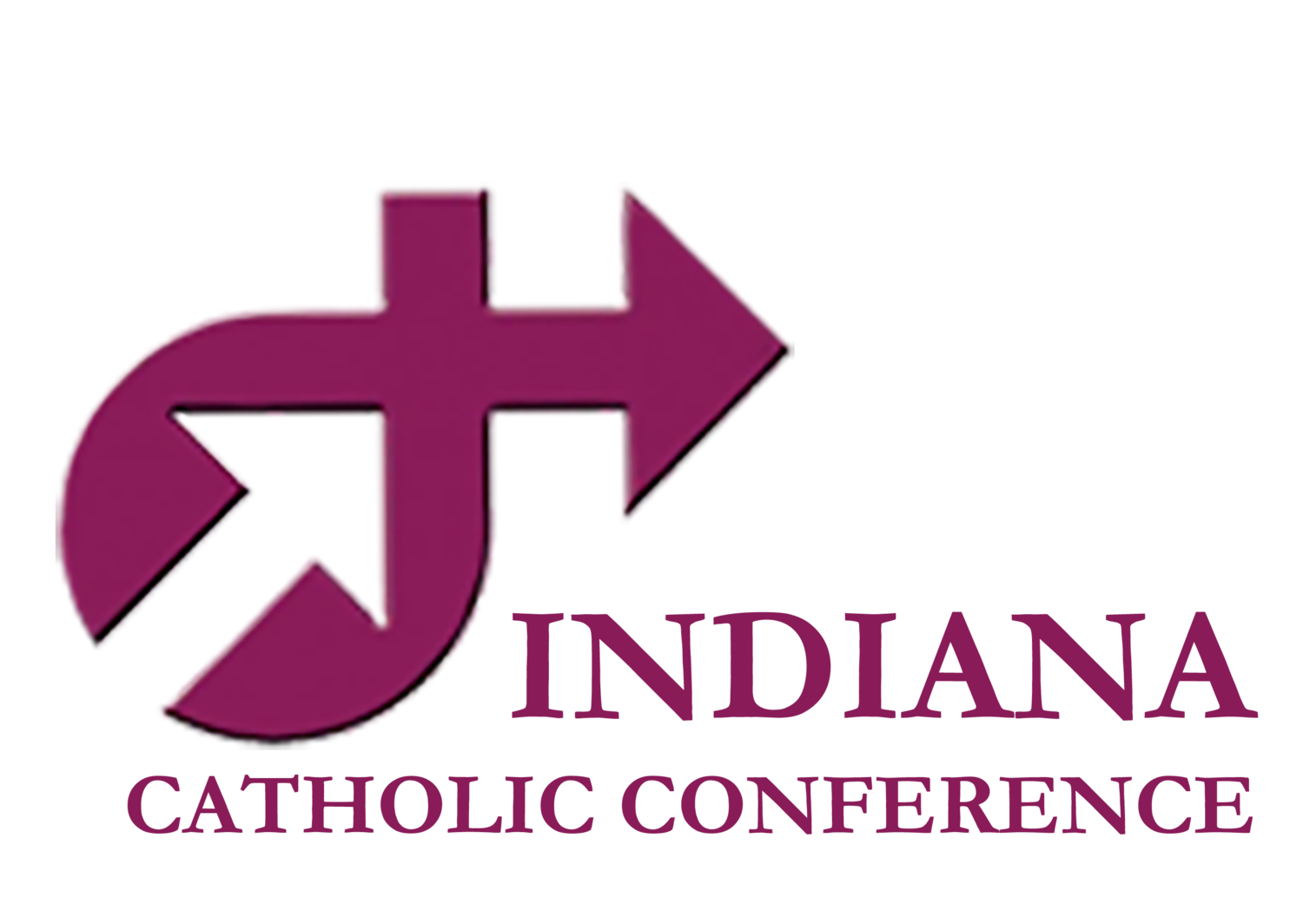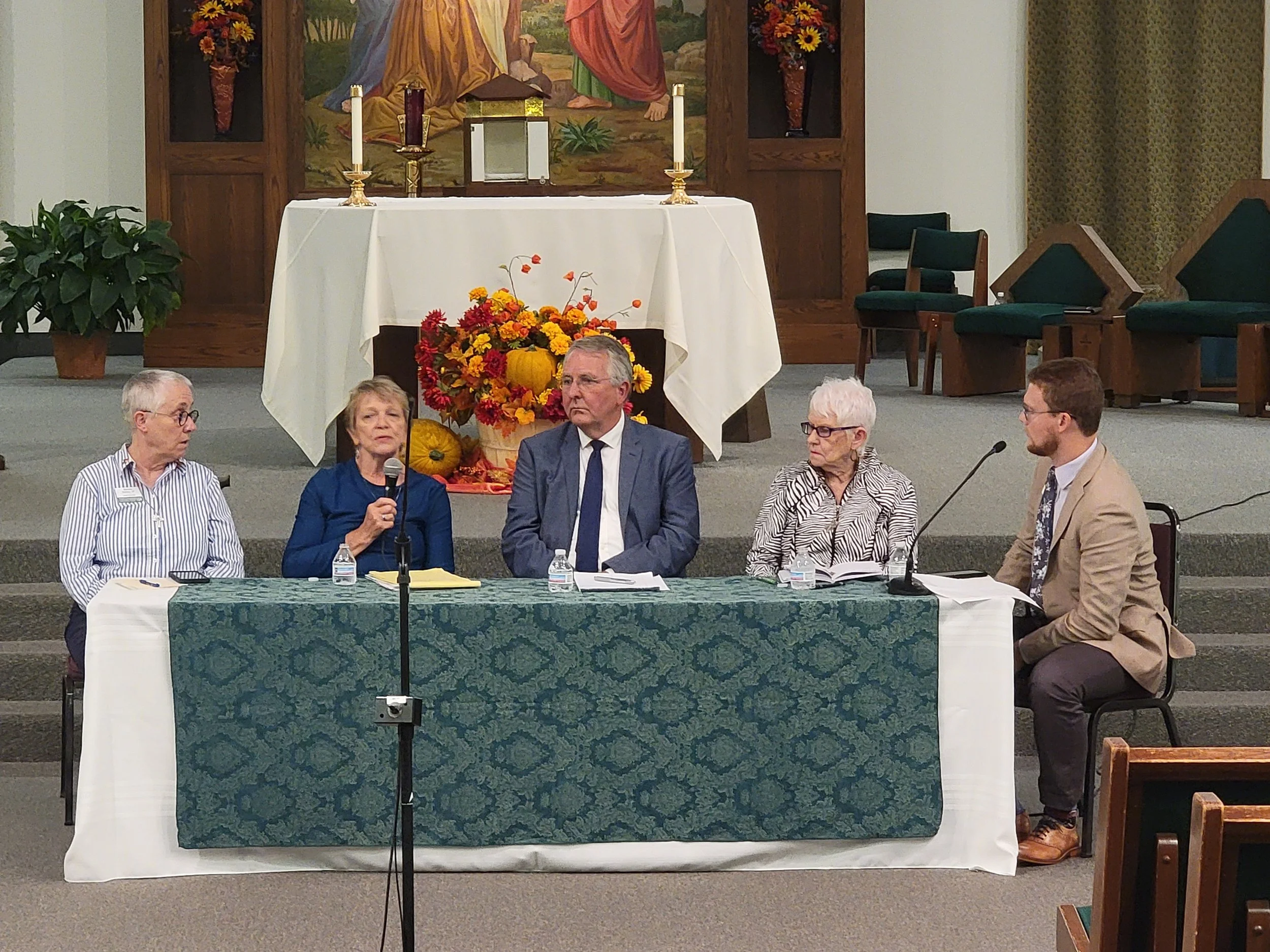‘Death for the sake of death’: Panelists weigh capital punishment as state executions continue in Indiana
By Victoria Arthur
As the state of Indiana was preparing to execute another inmate on death row, four people with deeply personal and direct experiences to capital punishment gathered in a sacred space to share their stories.
Holy Redeemer Catholic Church in Evansville, Ind., was the scene of the Sept. 29 panel discussion sponsored by the Indiana Catholic Conference (ICC) and the Indiana Abolition Coalition, an advocacy group calling for an end to the death penalty. Audience members heard emotional and sometimes graphic testimonials concerning the death penalty from a grieving mother, a public defender, a former corrections superintendent, and a nun who has accompanied men on death row and witnessed two executions.
“We may be in different places when it comes to how we feel about the death penalty,” said Alexander Mingus, executive director of the ICC, who served as moderator of the panel. “I hope that tonight you can just sit and rest in this space and take in the perspectives of these panelists.”
The event was held less than two weeks before Indiana executed its third death row inmate since the state resumed capital punishment in December 2024 after a 15-year hiatus.
Just after midnight on Oct. 10, which happened to be the 23rd annual “World Day Against the Death Penalty,” Roy Lee Ward died by lethal injection at the Indiana State Prison in Michigan City. Ward had been sentenced to death for the 2001 rape and murder of 15-year-old Stacy Payne in Dale, Ind., about 50 miles from Evansville.
For Mary Winnecke, an Evansville resident and one of the panelists at the Sept. 29 discussion, this crime hit close to home on more than one level. Winnecke had lost her own daughter, Natalie Fulkerson, in 1994 when a man close to the family brutally murdered her along with Natalie’s husband and sister-in-law.
Matthew Eric Wrinkles, the man convicted of the murders, was executed in 2009 – the last person put to death by the state of Indiana until the practice resumed before the end of 2024. His case had drawn national attention and was the subject of an episode of Oprah Winfrey’s talk show shortly before the execution.
Then, as she did again during the late September panel discussion, Winnecke described her journey toward acceptance of what happened that terrible night in 1994 and, ultimately, her path to forgiveness.
The journey was an agonizing one.
“I hated him,” Winnecke told those gathered in the sanctuary of her own home parish. “I couldn’t handle even thinking of his name. If I had been there that night and had a gun, I would have shot him. I’ll be honest with you.”
And then Winnecke described the moment that she said she heard God speak directly to her heart.
“So finally down the road, one day I hear God telling me, ‘You’ve got to pray for your enemy,’” Winnecke said. “Slowly but surely, God gave us the graces to forgive him.
“I pray for Eric every night now,” she continued. “I’m able to do it. God has given me total peace.”
Still, Winnecke and her family have been reliving the tragedy in an especially emotional way this past year as Indiana has resumed executions, with media coverage inevitably including the details of Natalie’s case. Over the years, Winnecke has become a strong advocate against capital punishment.
“If we have the death penalty, I’m no better than Eric was, because all I’ve done is pay somebody else through my taxes to murder someone,” Winnecke told audience members. “It’s murder, no matter what you call it.”
Her fellow panelists shared their own perspectives through their varied experiences with capital punishment.
Steve Schutte, an Evansville native and an attorney for the Indiana State Public Defender’s Office, has represented more than 30 men on death row. He has also witnessed five executions, including the May 2025 death by lethal injection of Benjamin Ritchie, who had been convicted of shooting and killing Beech Grove police officer William Toney in 2000.
Media accounts at the time of the execution included Schutte’s description of Ritchie’s body violently twitching as the lethal drugs were administered.
“There are significant issues about Indiana’s method of execution,” Schutte told the audience at Holy Redeemer Church.
Schutte said he had “no illusions” about Ritchie’s guilt in the police officer’s killing. But he also described the toll that executions take on state employees who work as corrections officers and get to know death row inmates personally, often over the course of many years. Four officers wrote letters to the Indiana Parole Board, asking them to commute Ritchie’s sentence to life without the possibility of parole.
“There was no excuse for what Benjamin Ritchie did,” Schutte told audience members on Sept. 29 – exactly 25 years after the crime that began as a police pursuit of a stolen van. “He deserved to spend the rest of his life incarcerated. But those four corrections officers who had come to know him thought (his execution) was simply unnecessary.
“It’s just death for the sake of death.”
Doris Parlette, former superintendent for the Indiana Department of Correction, told those gathered at Holy Redeemer that “a little bit of the warden dies with the prisoner” when executions are carried out. She cited a wide range of effects on state employees who have been worked long-term on death row – from sleep disorders to suicides.
“The cumulative effect is horrific,” said Parlette, who serves as a board member of the Indiana Abolition Coalition. “I believe in my heart that it’s a horrible thing to ask our state employees to do.”
‘Something that never leaves me’
Fellow panelist Sister Barbara Battista, a Sister of Providence of St. Mary-of-the-Woods, lives in close proximity to the federal prison in Terre Haute where the U.S. government resumed executions in 2001 after a 38-year hiatus.
A longtime health care professional, Sister Barbara has also served as a spiritual advisor to men on death row in Terre Haute and has witnessed two executions there – those of federal inmates Keith Dwayne Nelson and William LeCroy.
“I was with two of those men in the chamber,” Sister Barbara told the audience gathered in Evansville. “I know it’s a violent act.”
This is despite what she termed as the “veneer of respectability” that surrounds the execution process, which she said on the surface looks like a medical procedure is about to take place. Then she vividly described the “cruciform table,” with the individual strapped down, arms outstretched as the lethal doses are administered.
“There is something that just never leaves me,” Sister Barbara said of the process that she calls a “killing machine” and that she saw unfold before her eyes two times. “But God is good, and he showed me that Will and Keith both deserved to have someone in that room who was not intent on killing them.
“There’s something about that human connection – even in the midst of our government killing a person in our name.”
The Sister of Providence also shared with the audience that LeCroy had specifically asked her to pray the Divine Mercy prayer with and for him before his execution. She said that she continued to repeat portions of the well-known prayer, which is often said at a person’s deathbed, “until his last breath.”
“It just really moved me that this man was asking for mercy on the whole world,” Sister Barbara said. “This man who was being executed wanted to keep hearing that prayer.”
Looking back and moving forward
In addition to moderating the panel discussion, Alexander Mingus of the ICC offered audience members an overview of the history of the Church’s thinking on capital punishment.
“Catholic teaching on the death penalty is nuanced and beautiful,” said Mingus, whose organization serves as the official public policy voice of the Catholic Church in Indiana.
Mingus shared that for most of its 2,000-plus years, the Catholic Church recognized the legitimate use of the death penalty to punish an unjust aggressor and to keep society safe. The Church’s tone began to shift with Pope John Paul II, who, in his encyclical Evangelium vitae, advocated for its use only in “cases of extreme necessity” – cases which are “practically nonexistent.”
Mingus spoke to the now-canonized saint’s witness to the dignity of human life from conception to natural death. He noted how Pope John Paul II’s successor, Pope Benedict XVI, reaffirmed and expanded the Church’s stance on the death penalty, calling for its abolition.
“Most recently, Pope Francis changed the language in the Catechism of the Catholic Church in 2018 to declare the death penalty ‘inadmissible,’” Mingus said.
Guided by Church teaching, the ICC has consistently called for an end to the death penalty.
In this year’s legislative session, the ICC supported a bill introduced by Rep. Bob Morris (R-Fort Wayne) that sought to eradicate capital punishment in Indiana. Despite the measure not moving forward at the General Assembly, leaders of the ICC expressed hope for increased attention on repealing the death penalty as a witness to the dignity of human life.
“The 2026 legislative session will undoubtedly feature meaningful discussion on the state’s use of the death penalty and supporting victims’ families,” Mingus said. “We look forward to helping move the conversation away from the use of the death penalty and toward supporting victims’ families and reducing violent crime.”

